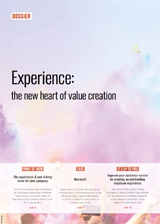Business growth in the 19th century was based on technological innovation, replaced following World War II by marketing, which served to underpin mass consumption. Nowadays, however, you need to do more than simply scale the heights of technology and market your products smartly if you want to attract customers or engage employees. “Humans,” according to Rebours and Pauly, “must take center stage in your value creation system.” Providing experiences that meet the changing needs of stakeholders has become the new engine of value creation, and is fast becoming your company’s most valuable asset and source of competitive advantage.
What is an experience oriented company?
In step with the changes taking place in society, the creators of digital start-ups and agile organizations were the first to try to synchronize uses and users. As far back as the early 2000s, their approach consisted of seeking constant feedback, so they could build on and improve user experiences. Airbnb, for instance, revolutionized the tourist trade by making it possible for individuals to rent out their private homes, a service that dovetailed with social changes regarding the concept of property leasing and ownership. Airbnb is now worth twice as much on the stock market as the French multinational hotel group Accor, which has reacted by refocusing its strategy on the “travel experience” instead of the simple “overnight product”. Decision-makers in traditional companies have been quick to adopt the idea of “experience”, often driven by the need for digital transformation. ING Direct, an off shoot of the Dutch postal bank, soon realized that growth in the private internet use could change the public’s relationship with the world’s number one on-line bank, and they simplified their customers’ banking experience accordingly. The notion of the quality of the experience is not limited to services; it can be found across all sectors of the economy, as shown by the case of PSA. Under the leadership of Carlos Tavares, CEO since 2014, PSA is positioning itself as a company that provides mobility solutions rather than a mere car manufacturer. PSA’s strategy has shifted from the idea of « techno push » – innovation propelled by technology – to a « human push » approach that focuses on uses and users.
The global scope of experience
Rebours and Pauly explain that experience-oriented companies are geared towards people’s needs. Customers first and foremost, followed not far behind by employees. Why? Because the quality of the customer experience is closely linked to the individual employees who shape it and the way they understand their mission. User experience is based on an on-going, collaborative relationship with employees and an iterative process of continuous improvement. BlaBlaCar, the car-pooling service, was designed in 2006 by a young entrepreneur, Frédéric Mazzella, who was looking for a practical and affordable fix to the problem of mobility. Once the solution was up and running, Mazzella insisted that his teams remained attentive to the needs of BlaBlaCar’s “members”, as customers are called. To encourage this attentiveness, he still encourages his employees to use the car-pooling service by offering them free rides. Employees provide feedback in return together with recommendations for improvement.
To read the article in full:

Based on L’expérience : le nouveau moteur de l’entreprise, by Christophe Rebours and Inès Pauly (Diateino, October 2016); “Why the Millions We Spend on Employee Engagement Buy Us So Little” by Jacob Morgan (Harvard Business Review, March 2017); “How Satya Nadella is making Microsoft cool again, and taking on Apple and Amazon” by Paul Smith (Financial Review, November 2016).


